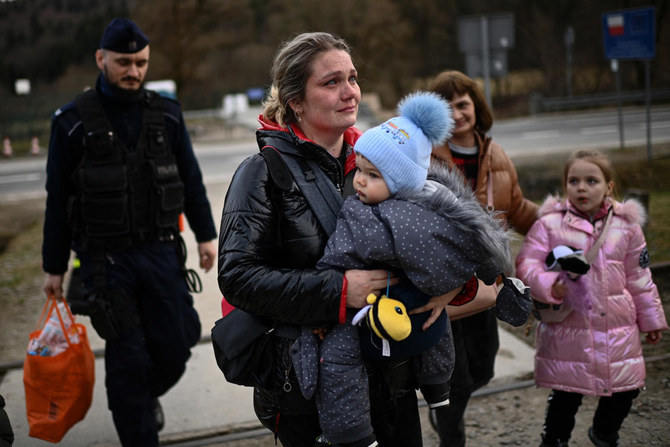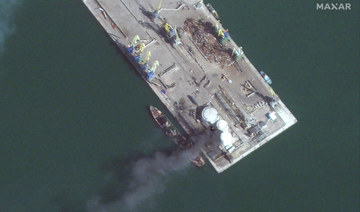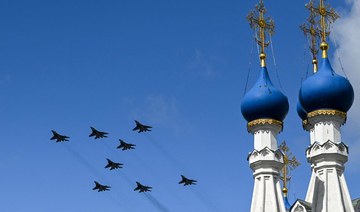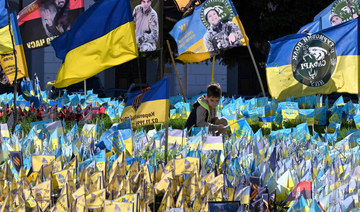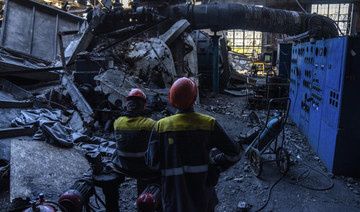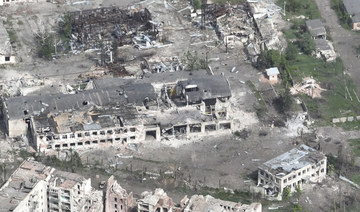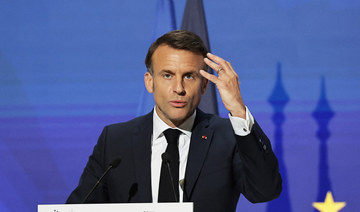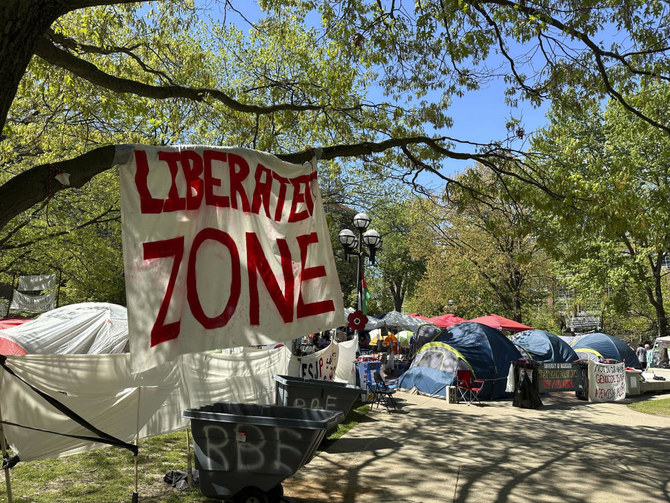ZAPORIZHZHIA: Almost 500 civilians have been evacuated from the devastated city of Mariupol and its besieged Azovstal steel plant in a UN-led rescue operation, the Ukrainian president’s office said Friday.
The United Nations had said Thursday that a new convoy would evacuate civilians from the “bleak hell” of the factory, which has become the last pocket of resistance in the southern port city.
“We have managed to evacuate almost 500 civilians,” Andriy Yermak, who heads Volodymyr Zelensky’s office, said on Telegram.
He said Kyiv will “do everything to save all its civilians and military” stuck in the devastated city, adding that the operation was ongoing.
The Russian military had announced a three-day cease-fire at the site starting Thursday but a Ukrainian commander said there was still heavy fighting at the sprawling complex.
Hundreds of soldiers and civilians have been holed up for weeks under heavy bombardment, many taking shelter in the plant’s Soviet-era underground tunnels.
Ten weeks into a war that has killed thousands, destroyed cities and uprooted more than 13 million people, Russia has focused its efforts on Ukraine’s east and south, and taking full control of the now-flattened Mariupol would be a major victory for Moscow.
“We still have to evacuate civilians from there, women and children. Just imagine... more than two months of constant bombing and constant death,” Zelensky had said Thursday.
Speaking to the Israeli prime minister Thursday, Russian President Vladimir Putin had said his military was ready to allow civilians to leave, according to the Kremlin.
“As for the militants remaining at Azovstal, the Kyiv authorities must give them an order to lay down their arms,” Putin said.
A commander of the Azov regiment defending the factory said in a video on Telegram that there was still heavy fighting.
“The Russians violated the promise of a truce and did not allow the evacuation of civilians who continue to hide from shelling in the basement of the plant,” Svyatoslav Palamar said.
Since failing to take Kyiv early on in its invasion, which began February 24, Russia has focused its efforts on Ukraine’s east and south.
Seizing the strategically located Mariupol would allow Moscow to create a land bridge between the separatist pro-Russian regions in eastern Ukraine and Crimea, which it annexed in 2014.
The Kremlin conceded Thursday that Kyiv’s Western partners had prevented a quick end to Moscow’s campaign by sharing intelligence and weapons with Ukraine, but that it was “incapable of hindering the achievement” of Russia’s military operation.
The United States is among Ukraine’s biggest backers, supplying military equipment and munitions worth billions of dollars as well as intelligence and training.
But the White House has sought to limit knowledge of the full extent of its assistance to avoid provoking Russia into a broader conflict beyond Ukraine.
Washington on Thursday denied an explosive report in The New York Times that it helped Ukraine target Russian generals.
“The United States provides battlefield intelligence to help the Ukrainians defend their country,” National Security Council spokesperson Adrienne Watson said.
“We do not provide intelligence with the intent to kill Russian generals.”
Separately, US media reported Thursday that Washington had shared intelligence that helped Ukraine sink the Russian warship Moskva last month.
However a US official, who spoke on condition of anonymity, told AFP that the United States does not “provide specific targeting information on ships.”
Ukraine’s government has estimated at least $600 billion will be needed to rebuild the country after the war.
Zelensky, who has tirelessly campaigned for help from allies, on Thursday launched a global crowdfunding platform called United24 to help Ukraine win the war and rebuild its infrastructure.
More than six billion euros ($6.3 billion) were collected at a donors’ conference in Warsaw, Polish Prime Minister Mateusz Morawiecki said Thursday.
In addition to financial and military assistance, Ukraine’s allies have also punished Russia for the invasion with unprecedented sanctions.
In one of the latest such moves, the British government said Thursday it had frozen the assets of UK-based steel and mining firm Evraz as it is of strategic significance for Russia’s war effort.
Evraz’s main shareholder is Russian oligarch Roman Abramovich, who is already under sanctions, and its main operations are in Russia.
And in another action against oligarchs close to Putin, authorities in Fiji seized the $300 million yacht of Suleiman Kerimov after the United States requested be held for sanctions violations and ties to corruption.
Fighting continued across eastern Ukraine.
Donbas regional governor Pavlo Kyrylenko said at least 25 civilians were wounded in an overnight Russian strike on the city of Kramatorsk.
Elsewhere, the Ukrainian army said it had retaken control of “several settlements on the border of Mykolaiv and Kherson regions.”
In the southwest, farmers racing to keep up with the spring planting season have found themselves plowing around unexploded ordnance — one more piece of worrying news for next year’s harvest in Europe’s breadbasket.
“Every day since the start of the war we have been finding and destroying unexploded ammunition,” Dmytro Polishchuk, one of the deminers, told AFP before heading into a field in the southwestern village of Grygorivka to destroy an unexploded rocket.



